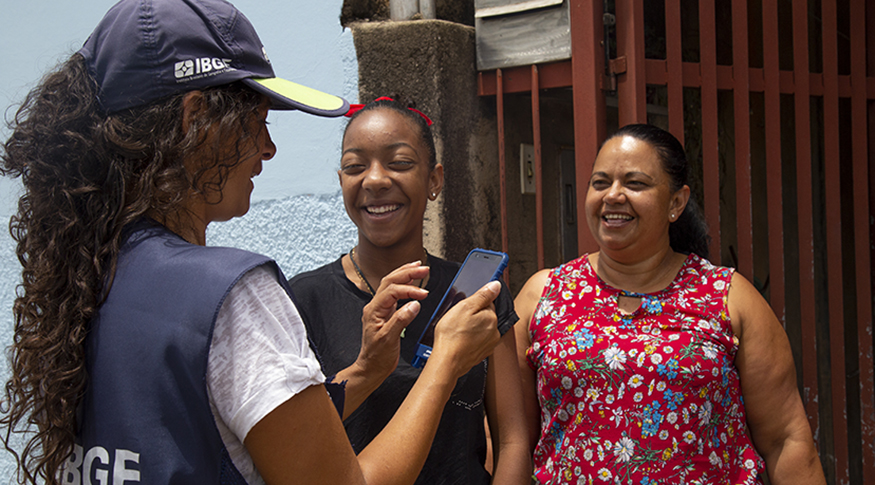International cooperation
IBGE and UNFPA go into partnership for cooperation in the Population Census
April 08, 2021 11h00 AM | Last Updated: April 09, 2021 04h40 PM

The IBGE and the UN Population Fund have signed a Memorandum of Understanding aiming at the expansion of institutional cooperation in technical actions related to the Population Census.
By means of initiatives and projects in technical assistance, the partnership presents strategic dimensions for modernization of the Brazilian census and of the IBGE’s statistical production, with a highlight to: i) improvement and development of data, including censuses, surveys and administrative records; ii) improvement and adaptation of Census technologies and methodologies and of surveys for its implementation in the context of the Covid-19 pandemic; iii) support for the development and use of modelled population estimates; iv) promotion of interchange of experiences and of good practices with other international partners.
Among the initiatives that form the scope of the partnership, a highlight is the Gradepop project, whose main product is the application of modelling techniques for the estimation of population density at grid cell and enumeration area levels. The project, which has been discussed with IBGE and UNFPA technicians - helped by experts in demography - can bring many advantages for the coming census operation.
The Memorandum of Understanding, signed by the IBGE and the UNFPA, consolidates an old partnership and, above all, innovates by improving quality of the census operation. In this respect, a highlight is Project Gradepop, which allows monitoring of the census in its three steps (pre-enumeration, enumeration and post-enumeration). It also advances in terms of the development of technologies for the use of symptomatic variables in population estimates. Gradepop makes possible an integration between statistics and geography, by helping consolidate a partnership between the IBGE’s Directorate of Surveys and Directorate of Geosciences,” says Eduardo Rios Neto, Director of Surveys at the Institute.
The partnership between institutions is part of a bigger context in the modernization agenda of the IBGE and of its statistical production, which has the Population Census as a catalyst and is anchored on technological transformation, the intensive use of administrative records and the strengthening of sample surveys.
Emerging challenges in Census innovation are also taken into account, since that means adoption of a mixed type of data collection (interviews conducted face-to-face, by telephone or by the Internet), definition of health protocols for data collection in the social distancing context; use of frontier technologies in supervision and monitoring of the operation.
The current cooperation is not only intended to address immediate challenges ahead of the Population Census, but also to foster different areas that, directly or indirectly, will benefit from that group of innovations.
“Technical interchange between the IBGE and the UNFPA will leave a legacy of modernization to Brazilian statistics. The pandemic, as a global event, has paved the way to the exchange of experiences and learning so that we have succeeded in facing challenges and keeping our statistical production for the last 13 months. This cooperation will bring a series of benefits to all the technical areas of the IBGE, with long-terms effects, certainly beyond its main objective of developing techniques and support tools to quality coverage in the next Census,”, says Susana Cordeiro Guerra, president of the IBGE.
The Memorandum of Understanding strengthens cooperation ties historically observed between the UNFPA and the IBGE, with a focus on modernization of the Institute’s statistical production during the pandemic. Both institutions have been partners in a long list of activities, mainly in the Demography and Census fields.
“As we usually put it, the Census is the backbone of the statistical system. It guarantees the production of essential data and information for the creation of public policies that can transform people’s lives. By means of data and information from the census, we can advance towards the monitoring of important international agendas, such as the 2030 Agenda and the Sustainable Development Goals. The census provides information to monitor the fulfillment of targets dealing with social and economic advances, gender equality, sexual and reproductive health, among other issues,” states Astrid Bant, representative of the UN Population Fund in Brazil.
“There is a growing demand for official statistics with greater thematic coverage, more timely and higher-quality, which can be useful for decision making in the public-policy field. There is also a growing recognition of the integration and participation of non-traditional sources of information and of new producers of statistics. It is precisely in this context that lies the cooperation and the potential for bigger integration between the IBGE’s work and the UNFPA’s view,” says Sabrina Juran, Regional Population & Development Advisor for Latin America and the Caribbean at the United Nations Population Fund.




















